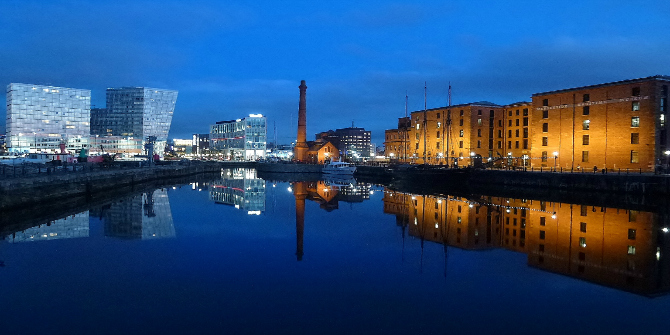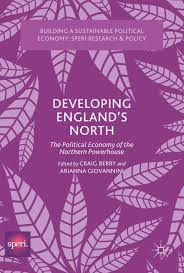In Developing England’s North: The Political Economy of the Northern Powerhouse, editors Craig Berry and Arianna Giovannini bring together contributors to explore different facets of the ‘Northern Powerhouse’ as announced in a Manchester speech by then UK Chancellor, George Osborne. This is a valuable collection that shows the incoherence and ineffectiveness of the NP, and the urgent need to develop political and economic alternatives, writes John Tomaney.
Developing England’s North: The Political Economy of the Northern Powerhouse. Craig Berry and Arianna Giovannini (eds). Palgrave. 2018.
On 23 June 2014, in a speech in Manchester, the then Chancellor of the Exchequer, George Osborne, announced the Northern Powerhouse (NP). To raise the economic performance of the North, Osborne called for a new policy approach building on the dynamism of cities, as attractors of the creative class that generates growth:
By joining our northern cities together – not physically, or into some artificial political construct – but by providing the modern transport connections they need; by backing their science and universities; by backing their creative clusters; and giving them the local power and control that a powerhouse economy needs.
A year later, immediately following the General Election that gave the Conservatives a small majority, again in Manchester, Osborne announced that the devolution of power to northern city regions must rest on the acceptance of the directly-elected Metro-mayor model. Somewhat disingenuously, he argued: ‘I will not impose this model on anyone. But nor will I settle for less.’
The proximate stimulus for this initiative was the 2014 referendum on Scottish independence and the need to make a political offering in England. But the Coalition government also was rhetorically committed to ‘rebalancing’ the UK’s economic geography, characterised by deep and longstanding inequalities. Additionally, a neglected but crucial dimension of the NP was its tactical importance in creating a new and more promising political space for the Conservatives in northern urban areas, hitherto Labour heartlands. Osborne was its guiding light.
The NP attracted media attention and extraordinary hyperbole. For instance, during Xi Jinping’s trip to Manchester City FC’s training ground in October 2016 as part of his state visit, the then UK Prime Minister, David Cameron, asserted: ‘You can really see the Northern Powerhouse gathering strength and it’s now got Chinese backing too.’ But sober early commentary was sceptical. Neil Lee, for instance, saw the NP as lacking clear objectives, acting primarily as a political brand for disparate and often pre-existing policies. With strange symmetry, on 23 June 2016, exactly two years after the announcement of the NP, large areas of the North voted ‘leave’ in the Brexit referendum: the ‘left behind’ had spoken. Shortly afterwards, Osborne was ejected from office by Theresa May and the NP was barely mentioned in the June 2017 General Election, in which the Conservatives lost their majority.
In Developing England’s North: The Political Economy of the Northern Powerhouse, Craig Berry and Arianna Giovannini bring together papers from a conference held in Sheffield in November 2015, which sought to shed light on these developments. The editors state their concern with the interplay of political and economic processes and how these shape ‘the social construction of the North, and the framing of its spatial identity’ (5). While always economically lagging, for the central state the North emerges periodically as a political problem, ‘while Northern elites are often complicit in the maintenance of national political-economic practices, even though such practices help to keep the residents of the North poorer’ (3).
 Image Credit: Albert Dock and Canning Half Tide Dock, Liverpool (Radarsmum67 CC BY 2.0)
Image Credit: Albert Dock and Canning Half Tide Dock, Liverpool (Radarsmum67 CC BY 2.0)
The remaining chapters tackle different aspects of the NP. Ron Martin and Ben Gardiner analyse the extent and longevity of regional economic imbalances in England. Simon Lee offers a counter-intuitive account of the ‘Southern Powerhouse’, centred on London and supported by a HM Treasury-led developmental state that selectively intervenes to pick winners, notably in the realm of finance. Kieron Flanagan and James Wilson show the massive scale of central government support for science and technology and universities in the ‘The Golden Triangle’ of London, Oxford and Cambridge. By comparison, the amounts of money committed to the NP are trivial and fail to offset the disproportionate impact of austerity. Berry links the NP to the history of UK industrial policy which typically marginalises manufacturing. He emphasises the distinctive character of deindustrialisation in the UK and its role in ‘decentring’ the North from the UK’s prevailing development model (106). Nick Gray et al seek to identify the economic model that frames the NP approach. From within a disorderly and unclear package they observe a focus on core cities/city regions as ‘drivers’ of growth (150). In his earlier chapter, Berry refers to the ‘agglomeration-based dogma’ (107) that informs the NP and produces new forms of inequalities and ill-serves the North.
Giovannini provides an incisive analysis of the tortuous story of devolution in Yorkshire, albeit one repeated elsewhere. Efforts to devolve power to city regions have failed because of the impossibility of achieving local agreement on boundaries in Sheffield, Leeds and Hull. Into the void emerged the proposal for devolution to Yorkshire as a whole. This case is based on identity claims that are neglected in the dominant, top-down model of devolution. Thus, technocratic arguments about the efficiency of city regions are pitted against arguments about identity and belonging. Giovannini draws attention to the lack of public engagement in existing devolution deals and considers the longer-term problems this raises in terms of the legitimacy and durability of new arrangements.
Echoing this analysis, a chapter by David Beel et al looks at the marginalisation of civil society organisations in central-local deal-making in Sheffield and Manchester. They note that the city region is presented discursively as a scale for the pursuit of economic competitiveness but to the neglect of the social dimension. Kevin Muldoon-Smith and Paul Greenhalgh offer a detailed, informative and carefully argued analysis of the devolution of the Business Rate Retention Scheme. They clearly demonstrate several ways in which the government’s proposal will disadvantage large parts of the NP regions and the inherent dangers of funding public services and investment through property taxes. The book concludes with the editors sketching out some elements of an alternative ‘political economy of place’ (311).
At times, the book shows signs of hasty production. There are an unusual number of typos, enticing references are missing from bibliographies and some citations are incorrect (e.g. McCann and Rodriquez-Pose, page 151; Houghton et al, page 159). Some chapters read like running commentaries that have already been overtaken by events. But, overall, Developing England’s North is a valuable collection with some strong contributions. The reader is left in little doubt about the fragility, incoherence and ineffectiveness of the NP and the pressing need to develop political and economic alternatives.
John Tomaney is Professor of Urban and Regional Planning in the Bartlett School of Planning, University College London.
Note: This review was originally published at LSE Review of Books and it gives the views of the author, and not the position of the LSE British Politics and Policy, or of the London School of Economics.


 Find this book:
Find this book: 




